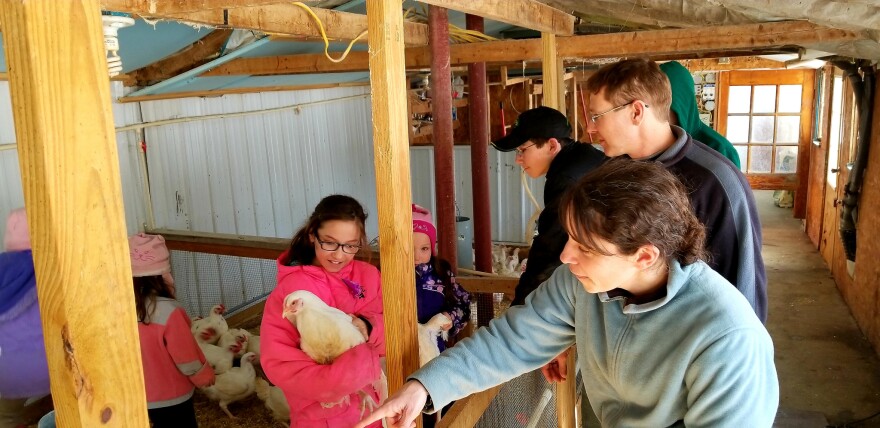Do you ever wonder what farmers are doing when it's 20 degrees below zero and the snow is as high as an elephant's eye?
It can be hard for farmers to make ends meet in the winter, but, even when the fields are buried in snow, the work never stops.
You might not recognize the first day of spring in Aroostook County, due to the ice crunching underfoot, or the four-foot snow banks framing the path to this potato house in Houlton.

Above the cacophony of giant fans, filters and air flaps, Erica Fitzpatrick of Fitzpatrick-Peabody Farm explains that potatoes demand storage conditions that are just right. They must be fine-tuned 365 days a year to ensure that the spuds stored don't get too hot or too cold, or as Fitzpatrick puts it "too stressed," as they sit waiting to be shipped to become fries and mash.
"It's a twelve month food cycle,” she says. “These buyers need product year round."
It’s not as simple as plant something in the spring, harvest it in the fall, then kick back and put your feet up all winter.
“But it's great,” says Fitzpatrick "because it's a different set of tasks and challenges we're working on."
The temperature last night was near zero, and that meant that Fitzpatrick and her crew had to pump in just enough heat to ensure that this nearly 5 million pound haul of potatoes didn't get too cold. But they also had to open up just enough vents and flaps to bring in plenty of fresh air.
Fitzpatrick, a former agronomist with McCain Foods, is also kept busy climbing up the potato mountain to sample the carbon dioxide, water and sugar levels.
And there are lots of other things that must be done before its time to plant.
"We source seed from a few different seed growers, we plant a few different varieties- securing that,” she says. “Cover cropping seed, spend time building what our custom fertilizer analysis will be again based on soil samples, we're food safety certified, sustainability, trying to keep up on some of that paper work procedures that go with that."
And of course there's tax and business planning. This is also the time when sizeable farms like Fitzpatrick-Peabody fix and maintain hundreds of thousands of dollars worth of planting, harvesting and trucking equipment.

About fifteen minutes up the road in Linneus, the Desrosiers are no less busy, but there's nothing very high tech about Sunnyside Family Farm. In addition to homeschooling their seven children, Clare and Joseph Desrosier sell pick-your-own high bush blueberries and process up to 7000 chickens each year by hand.
But without Clare's job with the local Catholic parish, the family would have a hard time making ends meet year round.
"The winter is tough because we don't have the extra income coming in,” Clare says. “And it's been a good three months of really scrimping to get to tax return time."
And that's the case with many small farms, says Richard Brzozowski with Maine Cooperative Extension. Either one partner has an off-farm job, or farmers find they need to do a fair bit of moonlighting.
"You know they may drive a truck, plow snow, sell firewood, or Christmas trees,” Brzozowski says.

In fact, this month Brzozowski is addressing a national USDA conference on this very subject, and he and his colleagues at Cooperative Extension have compiled a list of about 150 ideas for farmers to generate extra cash, year round. Among the options: hosting cross country skiing and snowshoeing, and weddings and gatherings. A farm with unused land could even start a pet cemetery.
"And then let them figure out what to do. I'm not telling people to get out of farming, but sometimes you need some other cash flow so they can keep the farming operation going," he says.
Meanwhile, back at Sunnyside Farm, the Desrosiers have chosen to introduce a bit more agritourism opportunities in the summertime as a way to plump up the overall farm income. Last year they planted 1000 raspberries, and the apple orchard they put in a few years back should be ready for autumn apple pickers a few years from now.
But all of that is going to add to Joseph's workload, which is already considerable.
“More than 80 hours a week I'd say,” says Joseph. “The hours are very long, but I'm not complaining. Yes, there are a lot of hours, there's always something to do. I'd never trade it for the world."
Originally published March 22, 2019 at 5:04 p.m. ET.





